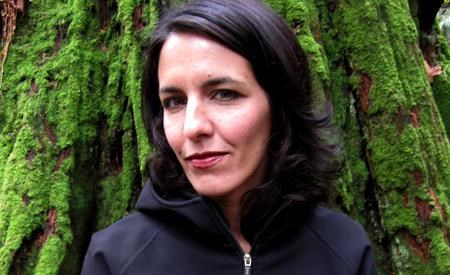Charlotte Gill started planting trees at 19 years old. She never thought 17 years later she would still be getting her hands dirty in isolated West Coast temperate rainforests.
“I was totally not a likely candidate to go tree planting. Look at me,” she said with a laugh. “I don’t look like someone who does hard physical labour. I look like a secretary.”
She explained that she “fell into the job by accident,” that tree planters in her life were “talking about it like it was this great outdoor adventure or going to Europe for the summer and hiking.” That is how she found herself out in the forests working side-by-side with other tree planters in a migrant lifestyle.
“Tree planters live anywhere from bush camps to float lodges to logging camps to motels,” she said. “Any different kind of transient living space you can think of tree planters will stay there.”
It was a transience which meant leaving home for months, never sleeping in one bed for long, creating intense friendships amid intense work and then watching it fade once winter came around. She said that intensity spilled over into everyday lives of tree planters.
“Tree planters never do anything just a little bit. When they sleep it’s like they’re in a coma. When they’re eating it’s like they’re eating 5,000 calories at once. When they’re partying it’s like they’re totally going overboard. Even some of the friendships last for maybe a few months in that kind of intensity and then when people separate for the winter there may be no contact at all.”
Gill retired from tree planting’s isolated intensity in 2008, but not before meeting the fellow tree planter she would marry. He is now a physiotherapist in Powell River.
She started writing her book Eating Dirt before walking away from the desolate trees she put into dirt with her own hands. Six years and 20 drafts later, Eating Dirt was published.
Gill returned from Toronto last week where Eating Dirt was nominated for the Charles Taylor Prize for Literary Non-Fiction. The book has won 2012 BC National Award for Canadian Non-Fiction, a Quill & Quire Non-Fiction Book of the Year and the iTunes Non-Fiction Book of the Year awards.
Gill’s nostalgic memoirs, when she speaks of her former life, describe how tree planting “stopped being a job and started being a way of life.”
“I think I would be a completely different person if I hadn’t gone planting trees. I had never done any kind of hard, manual labour before I was 19. Planting trees taught me how to work hard. There’s no getting around the hard work when you’re planting trees.”
She adds that the book’s success had her “totally shocked. The book is about a bunch of weird misfits because that’s what tree planters are,” she said. “To me it felt like so far away from every other part of Canada. It felt like a really regional tiny story and I wasn’t sure if anybody would read it who wasn’t a tree planter.”
Gill and her husband lived in Vancouver before moving to Powell River last October to reconnect with roots of her past.
“We missed being on the coast in the forests and Powell River is a place where you can look at the ocean and walk in the forest and climb a mountain all in one day. We had lost that connection when we were living in the city.”
There are parts of her tree-planting years that stay with Gill and there are parts left behind with the book’s completion. Her days of planting trees in snow, rain and other miserable weather are over.
Yet, with the same nostalgic tone as her book, she said there are things she does miss, such as crossing paths with wildlife and simply being out in the bush. But most of all, the people.
“There’s something about working that way with other people that you make friends really quickly. Someone can become your best friend within two or three hours. The book is behind me and I feel like that was my long farewell to the tree-planting life but it’s still a huge part of my life.”



